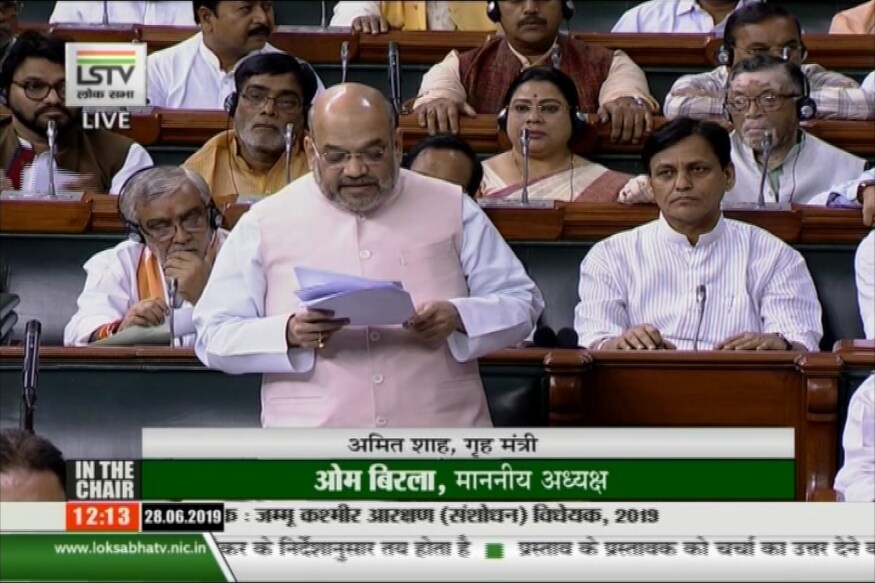Amit Shah Blames Congress for Sowing ‘Seeds of Mistrust’ in J&K, Hits Out at Dynastic Politics
Responding to charges of growing divide between Srinagar and New Delhi, Shah agreed there is a chasm between Kashmir and India, blaming Congress leaders for planting the seeds of mistrust.

Union Minister Amit Shah addresses the Lok Sabha on Friday.
New Delhi: Kashmiris are our brothers and sisters and we want to embrace them, Amit Shah said while moving the amendment bill of the Jammu and Kashmir Reservation Act, 2004, in the Lok Sabha on Friday. The legislation will provide reservation in educational institutions and government jobs to those living within 10 km of the international border (IB) along the Line of Control (LoC).
"It won't hurt us to give them extra out of our pockets," Shah said, adding that the people of the state had suffered a lot.
Responding to charges of growing divide between Srinagar and New Delhi, Shah agreed there is a chasm between Kashmir and India, blaming Congress leaders for planting the seeds of mistrust.
“Farcical elections were conducted by the earlier Congress governments in Kashmir. That sowed the seeds of mistrust. Till Morarji Desai and Atal Bihari Vajpayee's governments conducted the first free and fair elections in the Valley, all elections were jokes in the name of democracy,” Shah said.
The Union Home Minister further said the elections in the state would be held in the next six months after the ongoing Amarnath Yatra concludes, adding that the Centre would extend all its support whenever the Election Commission comes out with a schedule for polls.
An indication in Shah's speech could be the 1987 elections that have been reported to be heavily rigged by the Congress and its alliance partner in the state – the National Conference, then headed by Farooq Abdullah. Although Abdullah went on to assume the chief minister's chair, the rise in militancy after it forced him to resign and President's rule was imposed in the Valley till fresh elections were held in 1996.
Shah also launched a scathing attack against the ruling dynasts in the Valley, saying that the common people wanted a break from the Abdullahs and other political families who had maintained an iron grip on everything from panchayat polls to Lok Sabha election, stifling democracy in the process. “It is when a non-dynastic party has taken hold of the state that the people are now even happier,” he said.
Shah slammed the previous Congress governments for invoking article 356 (President’s rule) to undemocratically dismiss governments, and said that Congress helped the Muslim Conference, started in Kashmir by Sheikh Abdullah, by not setting up its party units there. "The Congress put all its eggs in Abdullah's basket and he ran away with the basket and, as a result, he became the Prime Minister there," Shah told the Parliament.
"We will protect the Kashmiri culture," Shah said, adding that opposing India does not fall in the ambit of ‘Kashmiriyat’.
“Those who want to separate J&K from India must have fear in their minds. Some say there is an atmosphere of fear there. Those who are against India should have fear in their hearts. We are not part of the ‘tukde tukde’ gang. We are not against common people of J&K,” Shah said, adding that a process of creating jobs for the youth has been put in place.
Shah also asked the Congress why the death of Bharatiya Jana Sangh founder Syama Prasad Mookerjee in a jail in Jammu and Kashmir was not probed by the then governments. “His death was also not probed. Why? Was he not a senior opposition leader? A leader from Bengal, a former Union Minister?” Shah asked.
The Lok Sabha on Friday gave its nod to the government’s proposal of seeking extension of President's rule in Jammu and Kashmir from July 3. The state has been under President's rule since December 2018 after the six-month long Governor's rule ended.